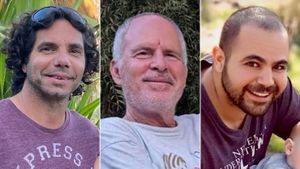Hamas has released three Israeli hostages as part of a significant prisoner exchange agreement, prompting widespread reactions and celebrations across both Israel and the Palestinian territories. This development marks the fifth round of exchanges negotiated through international diplomacy, amid soaring tensions and casualties following the conflict ignited by the Hamas-led attack on October 7, 2023.
The three Israeli hostages—Eli Sharabi, Ohad Ben Ami, and Or Levy—were freed early Saturday morning and delivered to the Red Cross at Deir al-Balah, located in central Gaza. Each had spent 491 harrowing days in captivity, facing deteriorated health conditions. Their release coincided with the liberation of 183 Palestinian prisoners by Israel, many of whom have reported physical abuse and poor treatment during their time behind bars.
Upon their release, the hostages appeared visibly frail. Isaac Herzog, President of Israel, expressed horror at their condition, lamenting their treatment at the hands of their captors. “Returning after 491 days of hell, starved, emaciated and pained,” Herzog stated, underscoring the physical and emotional toll inflicted on the men. Similarly, Prime Minister Benjamin Netanyahu criticized Hamas, labeling them as “monsters” and condemning the physical state of those released.
The Red Cross facilitated the transfer and confirmed the conditions of the hostages raised significant concern. Following the handover, the men were quickly reunited with their families, but not without deep emotional scars. Steve Brisley, the brother-in-law of Eli Sharabi, reflected on the painful reunion: “It’s incredibly difficult to see him thin, gaunt and being paraded by Hamas,” eliciting concern about the psychological effects of their long captivity.
Levy’s family revealed the devastating reality he faced upon returning home—he was unaware of his wife’s death during the attack. “Our hearts tremble and our minds struggle to comprehend,” they shared, caught between relief and sorrow.
Meanwhile, the released Palestinian prisoners returned home to joyful celebrations, albeit underlined by the painful realities of their incarceration. Videos showed crowds welcoming them, many of whom were reportedly suffering from ill health—a stark reminder of the brutal treatment some endured. The International Committee of the Red Cross (ICRC) raised alarms over the conditions under which the releases were occurring, stating: “This is increasingly concerning and urges all parties to prioritize the dignity of future exchanges.”
Among those freed was Jamal al-Tawil, 61, known for his prominent status within Hamas. His release was part of the deal negotiated after months of stringent back-and-forth between the conflicting parties. Palestinian groups have expressed the need for continued negotiations, asserting the necessity for improved humanitarian aid to Gaza, which has suffered tremendously during the prolonged conflict. Salama Marouf, spokesperson for Hamas, criticized Israeli delays on agreed humanitarian aid, labeling the situation “catastrophic.”
With 21 hostages and 566 prisoners freed since the ceasefire began on January 19, the exchanges highlight the immense personal and political stakes at play. Israeli negotiators have faced pressure to fulfill promises made to families of the missing and to address their well-being, with hundreds still unaccounted for.
The backdrop of these exchanges is tied to higher political tensions, particularly following U.S. President Donald Trump’s controversial proposal to transform Gaza following the ceasefire. His suggestion implies relocating all Palestinians and creating it as “an international travel destination.” The comment has faced backlash domestically and regionally, viewed as potentially exacerbative to existing hostilities. Leaders from various nations, including the UK and France, swiftly criticized the notion, reinforcing the need for Palestinians to remain and reclaim their homes.
Yet, as negotiations for the second phase of the ceasefire loom, uncertainties remain. The Israeli Defense Forces (IDF) have cautioned against celebratory gatherings following the release of Palestinian prisoners, indicating potential retaliation or unrest should tensions heighten. The stage is set for continued discussions; if the initial phases prove successful, they may trigger renewed hope for peace.
The emotional impact on families—from the joy of reunion to the grief of lost loved ones—paints the stark portrait of the human cost underlying these political maneuvers. Many families remain on edge, waiting for news of remaining hostages and praying for justice and healing.
With the clock ticking on negotiations, the only certainty is the deep-seated yearning for resolution and mutual respect—a desire shared by families on both sides, caught in the unyielding grip of this protracted conflict.



